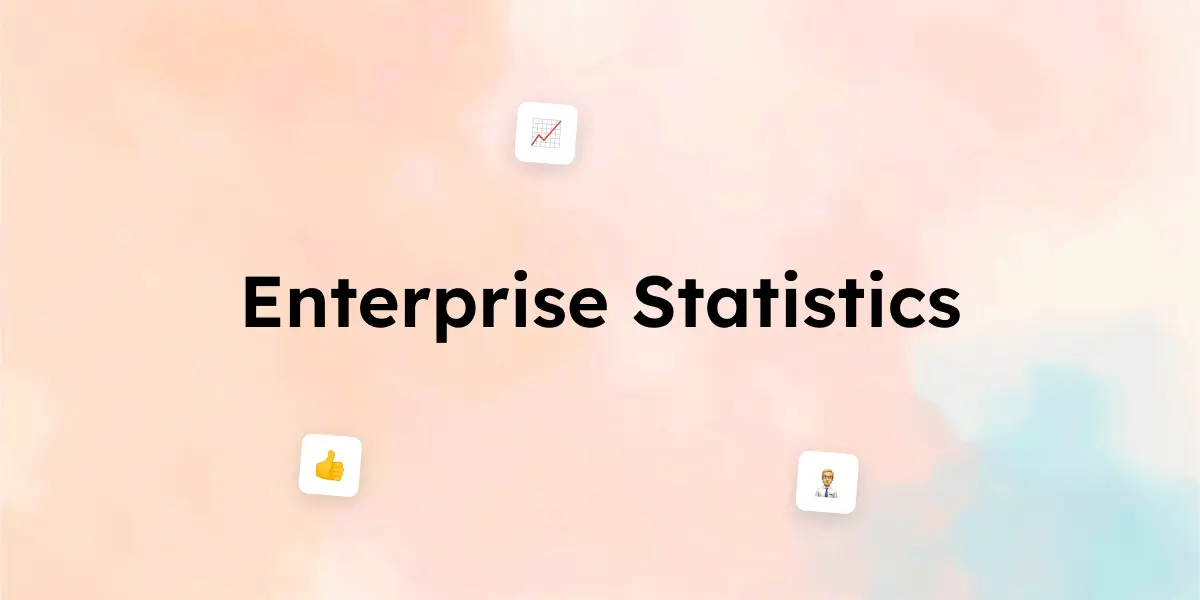The business landscape is evolving rapidly, driven by artificial intelligence (AI), cloud computing, cybersecurity, digital transformation, and sustainability initiatives. In 2025, enterprises are expected to accelerate their adoption of automation, hybrid work models, data security enhancements, and personalized customer experiences. Understanding the latest trends backed by data is crucial for businesses to stay competitive.
This article highlights 50+ key enterprise statistics that will shape the future of business in 2025. These insights cover AI adoption, cybersecurity threats, remote work trends, sustainability efforts, and customer experience innovations. By leveraging these data-driven insights, businesses can make informed decisions and align their strategies for success.
50+ Enterprise Statistics
1. Digital Transformation & AI Adoption
- 75% of enterprises will have fully adopted AI-driven automation by 2025.
- 90% of business leaders believe AI will give them a competitive advantage.
- AI-powered chatbots will handle 85% of customer service interactions.
- 80% of enterprises will integrate AI into their IT operations.
- The global AI market will reach $738 billion by 2025.
- 70% of organizations will use AI to automate at least one core business process.
- AI-driven data analytics will improve decision-making efficiency by 60%.
- 55% of enterprises will use AI for personalized customer experiences.
- AI-driven fraud detection will reduce financial losses by 40%.
- 50% of large enterprises will deploy AI-driven supply chain automation.
2. Cloud Computing & Data Management
- 95% of all enterprise workloads will be in the cloud by 2025.
- The global cloud computing market will exceed $1.3 trillion.
- 30% of enterprises will adopt multi-cloud strategies for improved efficiency.
- 60% of enterprises will move their data infrastructure to serverless computing models.
- Cloud-based data security spending will increase by 40% year-over-year.
- 72% of enterprises will prioritize cloud-native applications for scalability.
- The global enterprise SaaS market will reach $500 billion by 2025.
- 80% of businesses will integrate cloud AI to enhance analytics and decision-making
- 50% of businesses will use cloud-based disaster recovery solutions.
- 75% of large organizations will implement edge computing strategies to reduce latency.
3. Cybersecurity & Data Privacy
- 68% of enterprises experienced at least one major data breach in 2024.
- The predicted annual cost of cybercrime will reach $10.5 trillion by 2025.
- 60% of organizations will adopt zero-trust security models.
- 45% of enterprises will require employees to undergo mandatory cybersecurity training.
- 80% of enterprises will increase cybersecurity budgets in 2025.
- 40% of businesses will use AI-driven security solutions to detect cyber threats.
- The average cost of a data breach will exceed $5 million per incident
- Ransomware attacks will target 75% of global enterprises.
- 50% of enterprise leaders consider cybersecurity their top IT investment priority.
- 90% of cloud security breaches will be caused by human error.
4. Remote & Hybrid Work Trends
- 70% of enterprises will have a hybrid work model as the norm.
- 40% of employees prefer remote work at least three days a week.
- 65% of companies will increase investments in digital collaboration tools.
- Remote work is projected to save businesses an average of $11,000 per employee per year.
- 55% of workers say flexibility is a key factor in job satisfaction.
- 85% of remote workers use cloud-based tools for daily tasks.
- 30% of enterprises will downsize office space due to remote work adoption.
- 78% of IT executives are prioritizing cybersecurity for remote work policies.
- The number of remote job postings for enterprise roles will increase by 20% in 2025.
- 50% of remote workers report increased productivity compared to in-office work.
5. Enterprise Sustainability & ESG Initiatives
- 90% of enterprises will have carbon neutrality goals by 2025.
- Corporate investment in green energy solutions is expected to reach $50 billion
- 60% of enterprises will mandate sustainability reporting.
- 70% of Fortune 500 companies will adopt net-zero emission targets.
- Enterprises that implement sustainability initiatives see an average cost reduction of 15%.
- 55% of enterprise leaders believe ESG factors will impact future investment decisions.
- 80% of consumers prefer brands with strong environmental policies.
- 50% of companies will integrate circular economy principles into their operations.
- 65% of enterprises will use AI to track and optimize carbon emissions.
- Green supply chain initiatives will be adopted by 75% of large enterprises.
6. Customer Experience & Personalization
- 80% of customers expect brands to offer personalized experiences.
- 45% of companies will rely on predictive analytics for customer behavior analysis.
- 55% of enterprises will use AI-driven personalization for customer interactions.
- 70% of businesses say customer experience (CX) is their top brand differentiator.
- Personalized email marketing campaigns can increase revenue by 30%.
- 50% of enterprises will use augmented reality (AR) for enhanced customer engagement.
- 65% of organizations plan to invest more in customer data platforms (CDPs).
- Chatbots will handle 90% of customer inquiries in leading enterprises.
- 40% of customers will abandon a brand after just one poor experience.
- 85% of enterprise leaders believe CX investments lead to higher revenue growth.
Conclusion
As we enter 2025, enterprises must prioritize AI-driven automation, cloud computing, cybersecurity, and sustainable business practices. The shift toward remote work, zero-trust security models, and personalized customer experiences will redefine how companies operate.
Organizations that embrace digital transformation and invest in emerging technologies will gain a competitive edge. By leveraging data analytics, machine learning, and ESG initiatives, businesses can enhance efficiency, improve security, and meet customer expectations.
Staying ahead in this evolving environment requires data-driven decision-making and proactive technology adoption. These 50+ enterprise statistics provide a roadmap for businesses to navigate the changing landscape and achieve long-term success.
FAQs
1. Why are enterprise statistics important for business strategy?
Enterprise statistics provide data-backed insights that help businesses make informed decisions. By analyzing trends in AI, cybersecurity, cloud computing, and customer experience, companies can anticipate challenges, seize opportunities, and stay ahead of competitors.
2. How will AI impact enterprises in 2025?
AI will drive automation, predictive analytics, and personalized customer experiences. By 2025, 75% of enterprises will have fully adopted AI-driven automation, and AI-powered chatbots will handle 85% of customer service interactions. Businesses that integrate AI will improve efficiency and enhance decision-making.
3. What are the biggest cybersecurity threats for enterprises in 2025?
Cybersecurity threats are increasing, with 68% of enterprises experiencing a major data breach in 2024. The cost of cybercrime is projected to reach $10.5 trillion annually by 2025. Enterprises are prioritizing zero-trust security models, AI-driven threat detection, and employee cybersecurity training.
4. How is cloud computing shaping enterprise technology?
Cloud adoption is accelerating, with 95% of enterprise workloads moving to the cloud by 2025. Businesses are investing in multi-cloud strategies, serverless computing, and cloud AI to enhance scalability, security, and cost efficiency. The global cloud computing market is expected to exceed $1.3 trillion.
5. What role does sustainability play in enterprise strategies?
Sustainability is a top priority for enterprises. 90% of large companies will have carbon neutrality goals by 2025, and 60% will mandate sustainability reporting. Businesses investing in green energy, carbon tracking AI, and circular economy principles will see long-term cost savings and brand loyalty.
Sources & References :
Gartner – AI, cybersecurity, and cloud computing trends
McKinsey & Company – Digital transformation and AI in business
IBM Security – Cybersecurity threats and data breach statistics
PwC – Cloud computing and enterprise AI adoption
Deloitte Insights – ESG, AI, and digital transformation trends



